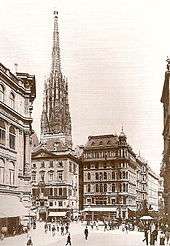Stephansplatz, Vienna
The Stephansplatz is a square at the geographical centre of Vienna. It is named after its most prominent building, the Stephansdom, Vienna's cathedral and one of the tallest churches in the world. Before the 20th century, a row of houses separated Stephansplatz from Stock-im-Eisen-Platz,[1] but since their destruction, the name Stephansplatz started to be used for the wider area covering both. To the west and south, respectively, run the exclusive shopping streets Graben (literally "ditch") and Kärntner Straße ("Kärnten" is the German for Carinthia). Opposite the Stephansdom is the Haas-Haus, a piece of striking modern architecture by Hans Hollein. Although public opinion was originally skeptical about the combination of the mediaeval cathedral and the glass and steel building, it is now considered an example of how old and new architecture can mix harmoniously .[2]
Stock im Eisen

The Stock-im-Eisen ("staff in iron") is located at the corner of Kärntner Straße and Graben in a niche on the corner of the Palais Equitable. It is a section of tree trunk into which hundreds of nails have been hammered since the Middle Ages, and which is ringed by an iron band closed by a large padlock. The earliest written mention of it dates to 1533 and it is the subject of legends about the Devil.
U-Bahn station
The U-Bahn station at Stephansplatz is one of the busiest in the city, and is the only junction between the U1 and U3 underground lines. It is also the nearest U-Bahn station to many of the tourist attractions in the city centre.
Virgilkapelle
In 1973, during excavation works for the U-Bahn station, a mediaeval chapel was discovered 12 metres under current ground level .[3] It was built around 1250 as a capella subterranea in the Magdalenenkapelle (the outline of which is shown on the pavement of the Stephansplatz). It is possible that it was originally intended as a chapel for burials, but at least by the 14th century had become a crypt for a mercantile family.
References
- Earlier still, until the 18th century, Stock-im-Eisen-Platz was the Alt-Roßmarkt or Old Horsemarket; Gustav Adolph Schimmer, Das alte Wien. Darstellung der alten Plätze und merkwürdigsten jetzt grösstentheils verschwundenen Gebäude Wien's nach den seltensten gleichzeitigen Originalen. Mit einem erlauternden Texte aus den bewahrtesten Geschichtsquellen, volume 8 Vienna: Zamarski, 1855, p. 14.
- "Haas-Haus". Glass Steel and Stone. Retrieved September 30, 2006.
- "Virgilkapelle". Wien Museum. Archived from the original on April 27, 2006. Retrieved September 30, 2006.
External links
- 360° panorama of Stephansplatz at Panoramic Earth